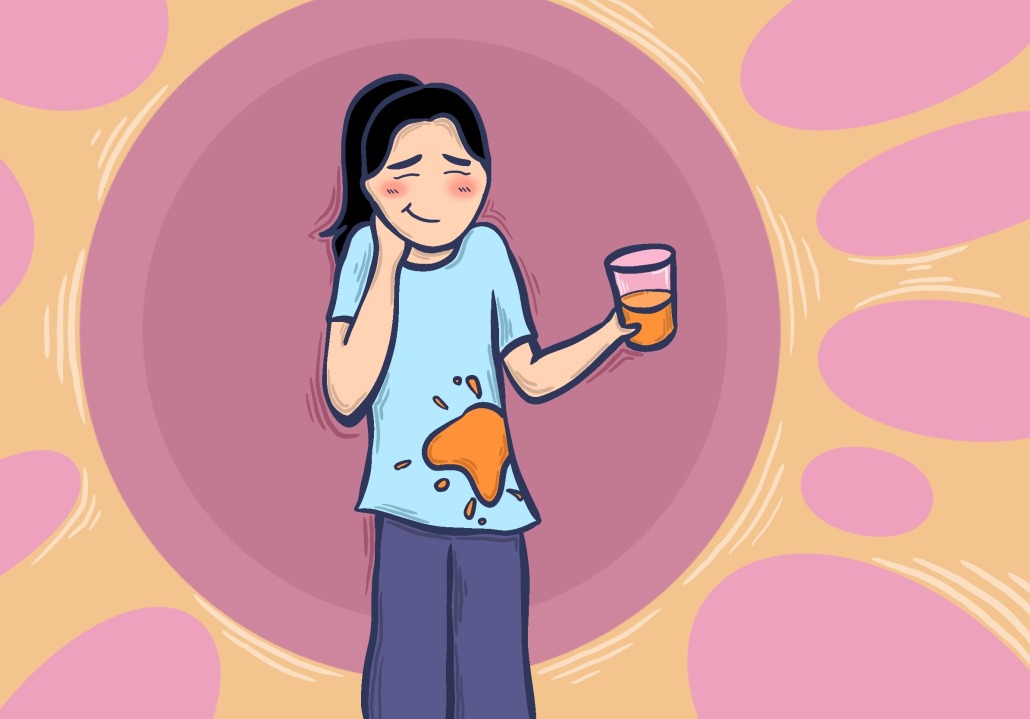THE (S)EXISTENTIALIST
Awkwardness is just main character energy
You don’t have to be cool to feel like the protagonist: lessons from cringe comedy.
You don’t have to be cool to feel like the protagonist: lessons from cringe comedy.


At some point in 2021, a freshman Kevin Gramling passed someone in the fourth-floor hallway of Parkside International Residential College. I couldn’t tell you who this person was now, and back then I couldn’t tell you much about them either. We weren’t really friends, nor were they particularly unique to me. That’s important because as we passed each other, they said “Hey,” and I said, “Hi, have a good day!” and then I became very angry with myself and then I went and cried on the stairs of the nearest parking lot.
I was mad because “Have a good day!” was the wrong thing to say, and I hated that I still panicked like this, and I cried because it was very confusing to feel angry at myself for telling someone to have a good day.
It was disappointing to arrive at USC and find that college does not come with the kind of sudden and effortless holy revival I felt was promised. I was somehow still awkward, still Kevin. The Kevin who walks around so engrossed in his daydreaming and mythologizing that, for fun, you might say hello just to see if you can catch the exact moment he rips back from four dimensions away. Blinking at you simply, you could really believe he is adjusting to being back on Earth.
A person’s awkwardness is personal and unique to them — there are many different reasons why someone might be or feel awkward. You might have difficulty reading social cues, or you are able to read them but you second and thirdguess yourself until you’re caught in a puzzle. Maybe you read social cues but have an adverse reaction to certain ones.
In my case, much of my awkwardness stems from my difficulty in navigating social scenarios that rely on non-explicit forms of communication. The everyday example of this is that moment in USC Village when you find yourself on an inevitable collision course with a loose acquaintance.
Everything is ambiguous — where are they headed? Are they expecting you to stop and catch up, or would they secretly be burdened? Will it be immediately obvious that you forgot their name? The nuances are so subtle that something as instant as a light smile paired with momentarily slowing down makes the difference between a long, awkward conversation or your buying groceries in a timely manner.
My difficulty with the socially unexplicit really shines, though, on dates — and, of course, in the bedroom. The cues for communicating attraction on a date aren’t usually explicit, even if they are very clear. On too many occasions, I’ve interpreted initial nervousness as disinterest, and I’ve spent the rest of the date awkwardly ceding to my eventual defeat until an intentional brush of a hand or, better yet, an explicit compliment complicates my initial reading.
I recall now a moment from one of my first hookups when the social etiquette of the one-night stand was still entirely unclear to me — in the silence immediately following, I wanted to make it clear where I stood, so I sat up from the bed, threw a thumb up and went, “Nice.”
It seemed obvious to me that my life would improve if I became more confident in my ability to navigate social encounters, so I resolved to amend my awkwardness. Because I mostly understand life by interpreting it into stories, it was through that cosmovision that I made my attempts.
I began by simply writing myself in as the confident, charismatic main character, but I couldn’t quite convince myself of such high fantasy when I still ducked off the road to avoid boys. I tried then to listen to angrier music and imagine myself an outcast who doesn’t care what anyone thinks. But I do care, so I gave up on that too.
You might understand, then, why the cringe comedy unit in my second-year television analysis class was significant. I watched closely as the shows “Fleabag,” “Extraordinary” and “Insecure” centered awkwardness and crowned the awkward person an everyday hero. These shows showed me how I, with my skill of existential storytelling, might be able to fashion a kind of radical self-acceptance.
I can be the awkward main character.
Every element of the cringe comedy is already there — the constant self-narration, nervous laughter, love interests, friends and a main character who thinks very hard but can’t figure any of it out.
With some imagination and a good sense of humor, there was a transfiguration as I turned my life into something the exact same and entirely new. The awkward blunders that used to take months and years now take minutes to realize themselves funny and absurd.
I’m still awkward; I usually feel anxious outside of Trader Joe’s, and I definitely haven’t figured out what to say right after sex yet, but it’s easy to let go when, worst-case scenario, I put on a pretty good show for myself. It’s not a steamy rom-com or some high-brow drama. It’s a cringe comedy, and, as it happens, that’s my favorite genre.
Kevin Gramling is a senior writing about his search for meaning amid the daily chaos of being a USC student. His column, “The (S)existentialist,” usually runs every other Monday.
We are the only independent newspaper here at USC, run at every level by students. That means we aren’t tied down by any other interests but those of readers like you: the students, faculty, staff and South Central residents that together make up the USC community.
Independence is a double-edged sword: We have a unique lens into the University’s actions and policies, and can hold powerful figures accountable when others cannot. But that also means our budget is severely limited. We’re already spread thin as we compensate the writers, photographers, artists, designers and editors whose incredible work you see in our daily paper; as we work to revamp and expand our digital presence, we now have additional staff making podcasts, videos, webpages, our first ever magazine and social media content, who are at risk of being unable to receive the support they deserve.
We are therefore indebted to readers like you, who, by supporting us, help keep our paper daily (we are the only remaining college paper on the West Coast that prints every single weekday), independent, free and widely accessible.
Please consider supporting us. Even $1 goes a long way in supporting our work; if you are able, you can also support us with monthly, or even annual, donations. Thank you.
This site uses cookies. By continuing to browse the site, you are agreeing to our use of cookies.
Accept settingsDo Not AcceptWe may request cookies to be set on your device. We use cookies to let us know when you visit our websites, how you interact with us, to enrich your user experience, and to customize your relationship with our website.
Click on the different category headings to find out more. You can also change some of your preferences. Note that blocking some types of cookies may impact your experience on our websites and the services we are able to offer.
These cookies are strictly necessary to provide you with services available through our website and to use some of its features.
Because these cookies are strictly necessary to deliver the website, refusing them will have impact how our site functions. You always can block or delete cookies by changing your browser settings and force blocking all cookies on this website. But this will always prompt you to accept/refuse cookies when revisiting our site.
We fully respect if you want to refuse cookies but to avoid asking you again and again kindly allow us to store a cookie for that. You are free to opt out any time or opt in for other cookies to get a better experience. If you refuse cookies we will remove all set cookies in our domain.
We provide you with a list of stored cookies on your computer in our domain so you can check what we stored. Due to security reasons we are not able to show or modify cookies from other domains. You can check these in your browser security settings.
These cookies collect information that is used either in aggregate form to help us understand how our website is being used or how effective our marketing campaigns are, or to help us customize our website and application for you in order to enhance your experience.
If you do not want that we track your visit to our site you can disable tracking in your browser here:
We also use different external services like Google Webfonts, Google Maps, and external Video providers. Since these providers may collect personal data like your IP address we allow you to block them here. Please be aware that this might heavily reduce the functionality and appearance of our site. Changes will take effect once you reload the page.
Google Webfont Settings:
Google Map Settings:
Google reCaptcha Settings:
Vimeo and Youtube video embeds:
The following cookies are also needed - You can choose if you want to allow them:
